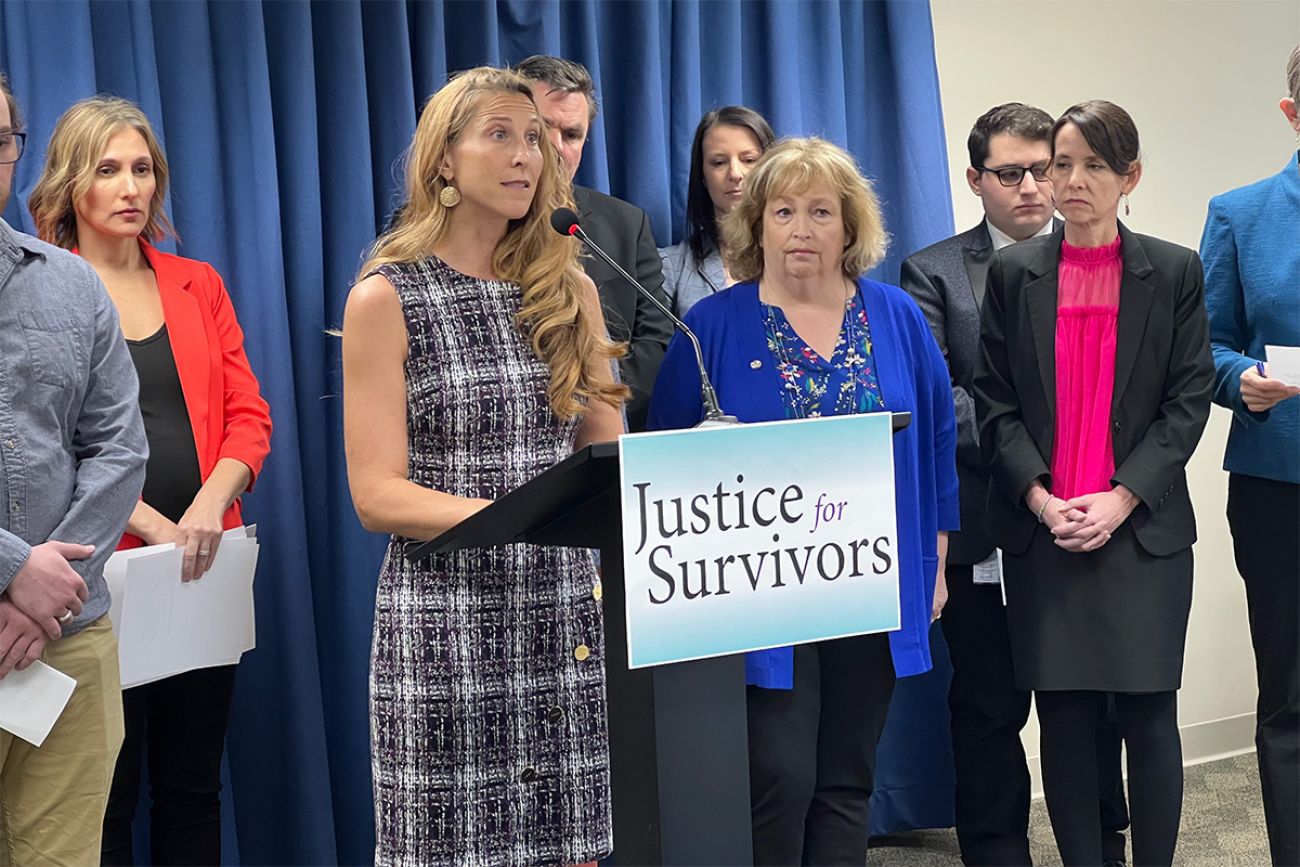New Michigan bills could give sexual abuse survivors more time to sue

- A bipartisan legislative package would allow sexual abuse survivors more time to sue until they turn age 52
- The legislation would also hold government agencies accountable if they know of a sexual abuse but fail to prevent it
- The bills follow several sexual abuse scandals at a few Michigan universities in recent years
LANSING — Former gymnast Trinea Gonczar was 8 years old when the abuse from her doctor began. And in the next 10 years, she said she was sexually assaulted more than 850 times.
But Gonczar kept quiet until she turned 37 in 2018.
“I was … heavily groomed into believing that what was happening to me was with the intention to help me compete,” Gonczar, a former gymnast and survivor of now-convicted child molester Larry Nassar, told reporters at a Thursday press conference in Lansing.
Related:
- Michigan Democrats eye hate crime reform, look to add LGBTQ protections
- Michigan State to raise room and board; still won’t release Nassar docs
- Kalamazoo YWCA seeks tax dollars to support gender affirming, abortion care
Gonczar, along with several other sexual assault survivors, urged state lawmakers on Thursday to pass a nine-bill bipartisan package that would extend the statute of limitations for sexual abuse survivors to file lawsuits, provide more resources for them and remove government immunity when the agencies are aware of the abuse.
Advocates say the legislation would give survivors more time to come forward and offer them more tools to navigate the criminal justice system.
“There is no timeline to processing sexual assault,” said Hannah Smith, also a sexual assault survivor. “There is no magic amount of time when you wake up and are ready to share what happened.”
The legislation — introduced this year during the National Sexual Assault Awareness Month — follows other sexual abuse scandals in Michigan over the past years.
In one of the biggest child molestation cases that shocked the nation, Nassar, the former national gymnastics team doctor who also practiced as a team physician and assistant professor at Michigan State University, was found guilty for sexually abusing numerous young women.
Hundreds of other female gymnasts sexually assaulted by Nassar reached a $380 million settlement with the U.S.A. Gymnastics and the United States Olympic & Paralympic Committee. Nassar was sentenced to 40 to 175 years in federal prison and his license to practice medicine was permanently revoked in 2018.
Starting in 2020, almost 1,000 people have claimed sexual abuses by the now deceased University of Michigan athletic doctor Robert Anderson ranging over decades. In Ypsilanti, dozens of survivors reported sexual abuse by Eastern Michigan University fraternities between 2014 and 2020.
Following the Nassar scandal, state lawmakers in 2018 passed laws to extend the statute of limitations for sexual abuse survivors. Under current law, they can take legal actions until they turn 28 or three years after they discover they were assaulted.
But most child abuse survivors do not report the crime until later in adulthood, advocates said Thursday. The average age for a child sexual abuse survivor to report their abuse is 52 years old, according to a 2014 study of 1,050 survivors.
That’s because some children often cannot recognize sexual abuse, lack the ability to articulate the abuse, don’t have opportunities or trusted adults to go to and are not believed when they do report the abuse, according to nonprofit child advocacy group Child USA.
Nationally, child protection services receive or substantiate a claim of child sexual abuse every nine minutes, according to the nonprofit group Rape, Abuse & Incest National Network.
But more than two out of three sexual abuses go unreported, according to the group’s analysis of the National Crime Victimization Survey results. Most survivors chose not to report the crime out of fear of retaliation, the belief that the police would not help them or the idea that the assault was a personal matter, the group says.
The first part of the legislation introduced Thursday — titled “Access to Justice” — would extend the statute of limitations to allow survivors to sue before they turn 52. The legislation would also give survivors a two-year window — instead of the 90-day window under current law — to take legal actions about the crime after the statute of limitations expires.
Additionally, it would stop granting government agencies immunity if the agency or employees know – or should have known – about the reported sexual assault and failed to prevent it.
Gonczar, the former gymnast who now helps sexual abuse victims at the Avalon Healing Center, said the bills would help hold institutions accountable, calling the scandals at MSU and UM “the largest institutional failures to date.”
“Both (doctors) were allowed to practice for multiple years, in fact, decades after reports were made, without single repercussions,” she said, “which in turn is the exact way to attract predatory behavior to not only flourish, but to be welcomed.”
The second part of the legislation titled “Survivors Bill of Rights” would require that survivors are informed of their right to access advocates, attorneys, counselors and other supports as they navigate through the reporting process. They would also require hospitals with shower facilities to offer free showers to survivors after forensic exams.
“This is something that we don’t think about,” said Emily Meinke, former teammate of Gonczar’s who also survived Nassar’s assaults. “Can you imagine going to a forensic exam, being terrified, being hurt, scared, and then not even having access to a shower afterwards?”
Similar bills were introduced after 2018 but failed to gain traction amid strong opposition from universities, municipalities and churches, who cited financial implications of potential lawsuits over old allegations, The Detroit Free Press reported.
Rep. Julie Brixie, D-Meridian Township, said Thursday she would not waver before such opposition.
“I don’t know how anyone could live with themselves if their job causes them to defend and lobby for rapists, to protect rapists,” she said.
See what new members are saying about why they donated to Bridge Michigan:
- “In order for this information to be accurate and unbiased it must be underwritten by its readers, not by special interests.” - Larry S.
- “Not many other media sources report on the topics Bridge does.” - Susan B.
- “Your journalism is outstanding and rare these days.” - Mark S.
If you want to ensure the future of nonpartisan, nonprofit Michigan journalism, please become a member today. You, too, will be asked why you donated and maybe we'll feature your quote next time!




